Brighter Shores in Early Access – Is It Worth Your Time? (Spoiler: Yes)
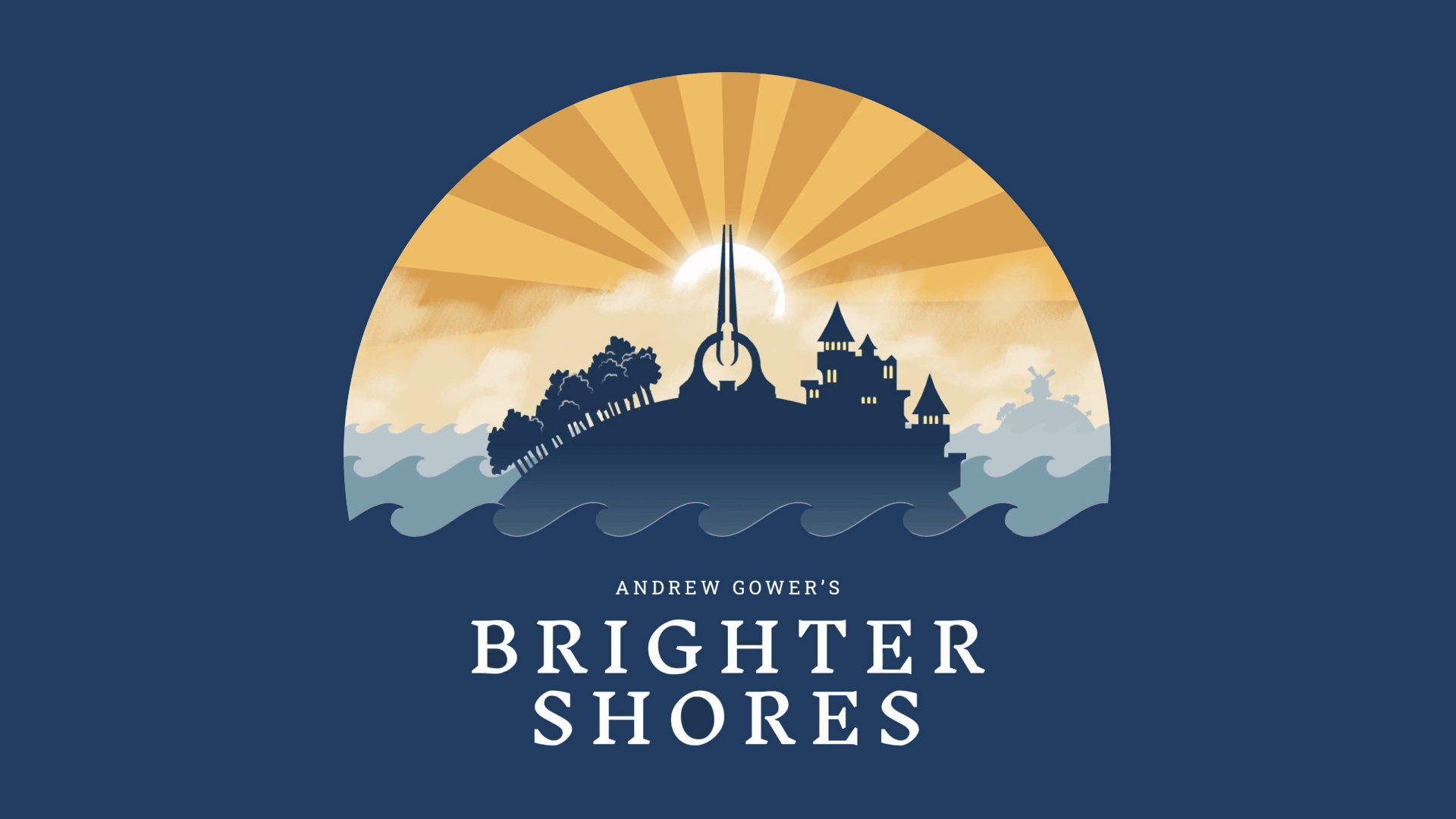
It's been a little over a month since Brighter Shores launched into early access, and I've had plenty of time to dive in and see what it has to offer. For those who haven't heard of it, Brighter Shores is a new MMO developed by Andrew Gower and his team at Fen Research. If that name sounds familiar, it's because Andrew—along with his brothers Paul and Ian—created RuneScape back in the early 2000s, one of the most iconic MMOs ever made.
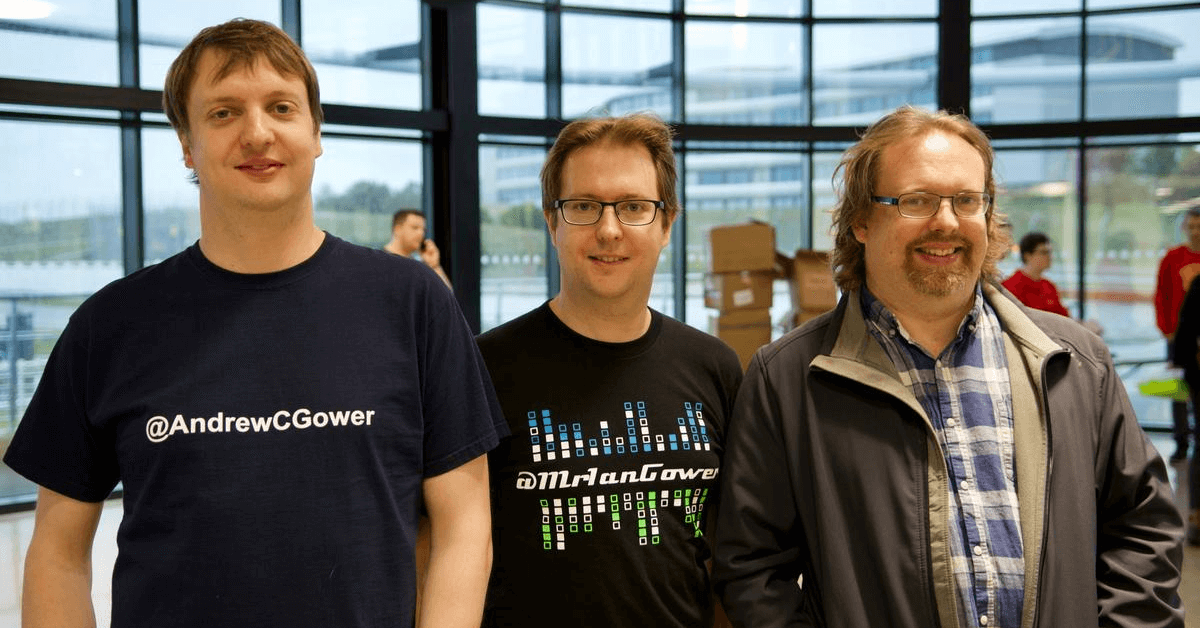
Brighter Shores is an MMO at its core, but it takes a different approach to some traditional systems, offering unique mechanics that set it apart. Some of these design choices—like its "room" system—sparked plenty of debate when the game was announced. But now that I've spent hours exploring its world and mechanics, I'm here to break it all down: the good, the bad, and what the future might hold.
The Room System: A Unique Take on World Design
One of the first things you'll notice about Brighter Shores—whether from the trailer or just stepping into the game—is its "room" system. Unlike most MMOs that offer sprawling, seamless open worlds, Brighter Shores breaks its world into smaller, self-contained areas called rooms. These rooms function as distinct zones, or "chunks," of the map. Outdoor rooms are typically around 20x20 tiles in size, while indoor rooms cover the interiors of buildings.
At first glance, this system raised a lot of eyebrows. Before the game's release, there was skepticism around how a segmented world would feel to explore. Would it be clunky or slow? Would it take away from the immersion? After spending significant time with it, I can confidently say that it works better than expected. The system brings its own charm and helps Brighter Shores stand out from the usual MMO mold.
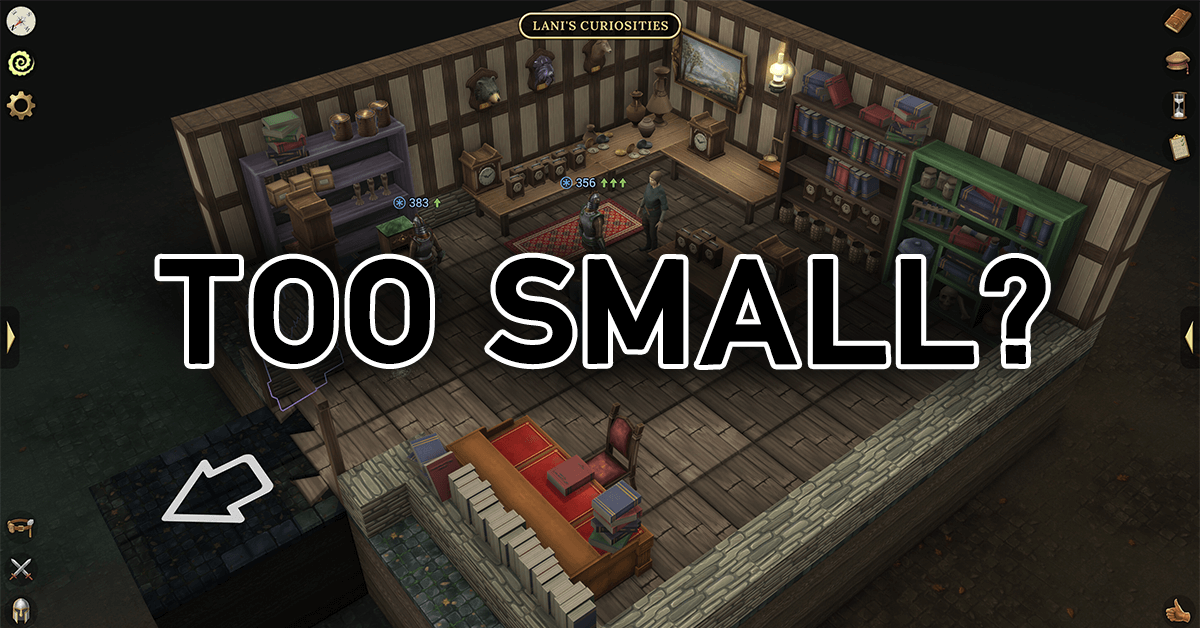
One big benefit of the room system is that it keeps the game accessible for a wider range of devices. Whether you're on a phone, tablet, Steam Deck, laptop, or desktop, the smaller areas mean there's less to render, which translates to smoother performance. For a modern MMO in early access, this level of optimization is a major win.
However, the room system does come with a notable drawback: chat suffers. Since chat is restricted to individual rooms, it's incredibly hard to hold conversations with other players—especially when training professions that require you to move between rooms frequently, like Forager, Miner, or Merchant. Combined with the current lack of interaction features (which the developers are actively working on), this limitation really makes the game feel like a single-player experience sometimes.
The good news is that the developers have acknowledged this issue and are prioritizing improvements to the chat system. Once fixed, this should make the game feel much more social and connected.
That said, navigating between rooms did feel a bit clunky at launch. Thankfully, the developers addressed this quickly by adding minimap movement—a small but impactful quality-of-life improvement. You can now click on the minimap to move your character, making exploration much easier and more intuitive (especially for those of us who play RuneScape).
While it's fair to say that the room system won't appeal to everyone, I think it's one of the game's strengths. It's a design choice that gives Brighter Shores its own identity in a genre that often feels oversaturated with "samey" open worlds. Plus, it's a foundation that Andrew and his team can continue to refine as the game develops.
Episodes: Breaking Up the World
Another standout feature of Brighter Shores is its Episode system. Instead of a single, sprawling world, the game is divided into larger sections called Episodes. Each Episode offers its own distinct theme, storyline, quests, professions, and enemies. If you're familiar with World of Warcraft, think of Episodes as expansions. You progress through each Episode in sequence, completing the main story before moving on to the next area.
Currently, there are four Episodes, with the final one (at the time of this writing) being Episode 4: Crenopolis. While you'll "finish" an Episode's main content before progressing to the next, the design ensures you're never done with older Episodes. Whether it's leveling professions, completing side quests, or hanging out with friends, there's always a reason to return to earlier areas. With planned features like trading and PvP on the way, these older Episodes are bound to remain active and relevant.
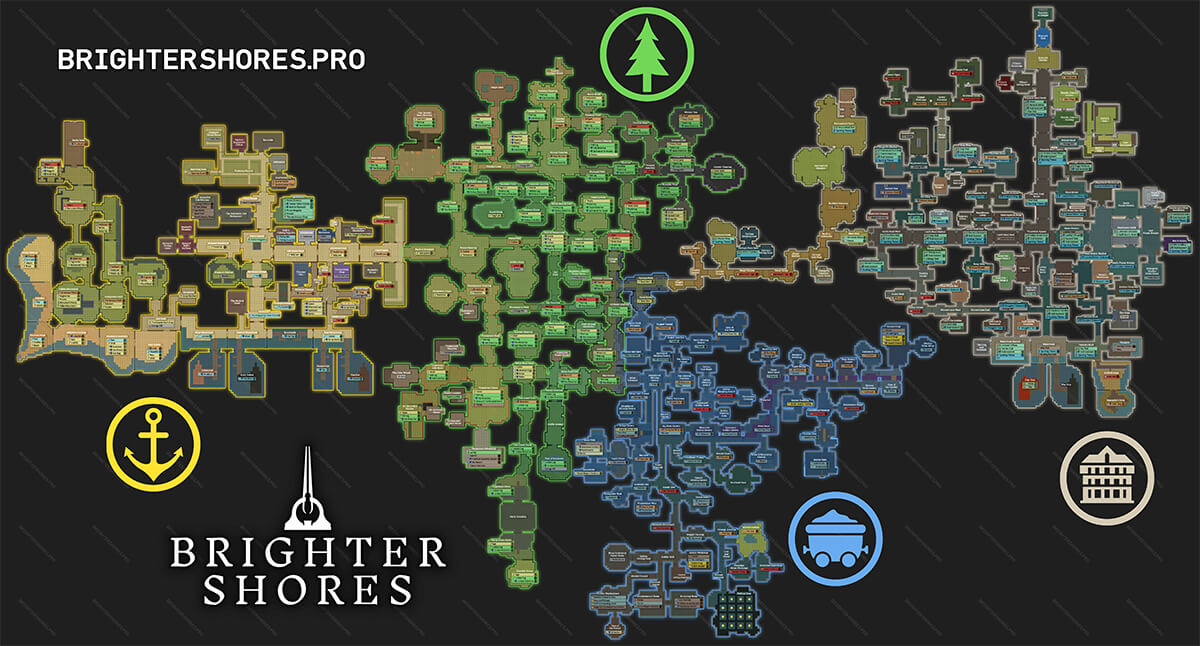
One of the key benefits of the Episode system is that it keeps the game feeling fresh whenever new content drops. When a new Episode is released, everyone starts at the same point, more or less. While veteran players might have slight advantages—like gold saved up, tools on hand, or potions ready to go—it's designed to provide a fair playing field for all. This approach avoids the common MMO problem where new players feel left behind, or veterans feel like they've "out-leveled" new content before it even arrives.
It's a clever design choice that promotes longevity while keeping progression balanced. And with the promise of new Episodes being added regularly, the world of Adothria will only continue to grow, giving players something to look forward to year after year.
Professions and Skills: A Deep and Focused System
Professions—what Brighter Shores calls its skill system—are a major highlight of the game, and they add a ton of depth to its design. Each Episode introduces around 4-5 unique professions that are exclusive to that specific area. For example, Episode 1 includes the Fisher profession, while later Episodes bring professions like Bonewright, Detective, Merchant, Woodcutter, and many others.
At first glance, the level cap of 500 for each profession might seem absurd—especially for players familiar with RuneScape and its infamous grind. Surprisingly, it's not as overwhelming as it sounds. Dedicated players hit level 500 within just a few weeks in some professions. That said, not all professions are created equal; some are much easier to level than others, and as of now, there are still professions where no one has hit the cap yet.
What really makes the system unique is its Episode-based specialization. Each profession can only be trained within its respective Episode. For example, Fisher is exclusive to Episode 1. Once you move on to later Episodes, Fisher essentially becomes inactive—though you retain your levels and items. While this might seem restrictive, it's actually a smart design choice. By isolating professions to specific Episodes, the game avoids cluttering the world with too many mechanics or forcing old skills into new areas where they don't fit. It's a cleaner, more focused approach compared to other MMOs, where content can sometimes feel shoehorned in over time (looking at you, RuneScape 3).
The profession system also encourages players to revisit earlier Episodes. Whether you're trying to level up a skill, gather resources, or complete side quests, older Episodes remain relevant and alive long after you've moved on in the main story.
Overall, professions are a great mix of variety and depth, offering something for both casual players and completionists. And with each Episode introducing new professions, there's always something fresh to learn and master.
Combat System: A Work in Progress
Combat in Brighter Shores is, admittedly, one of its weaker aspects right now. While the core idea aligns with the game's Episode-focused design—each Episode having its own combat profession (Guard, Scout, Minefighter, Watchperson)—this separation feels awkward in practice. Once you move to a new Episode, all of your combat levels and equipment from the previous one become essentially useless. Sure, those levels still matter if you return to earlier Episodes, but during progression, it's hard not to feel like your combat efforts are repeatedly reset.
The combat system itself is currently pretty barebones as well. You click on an enemy, select your weapon, and then watch as your character and the enemy take turns attacking. While this approach is functional, it doesn't offer much excitement or depth. Weapons only differ in attack speed and appearance, and with special attacks not yet implemented, combat can feel repetitive and underwhelming.
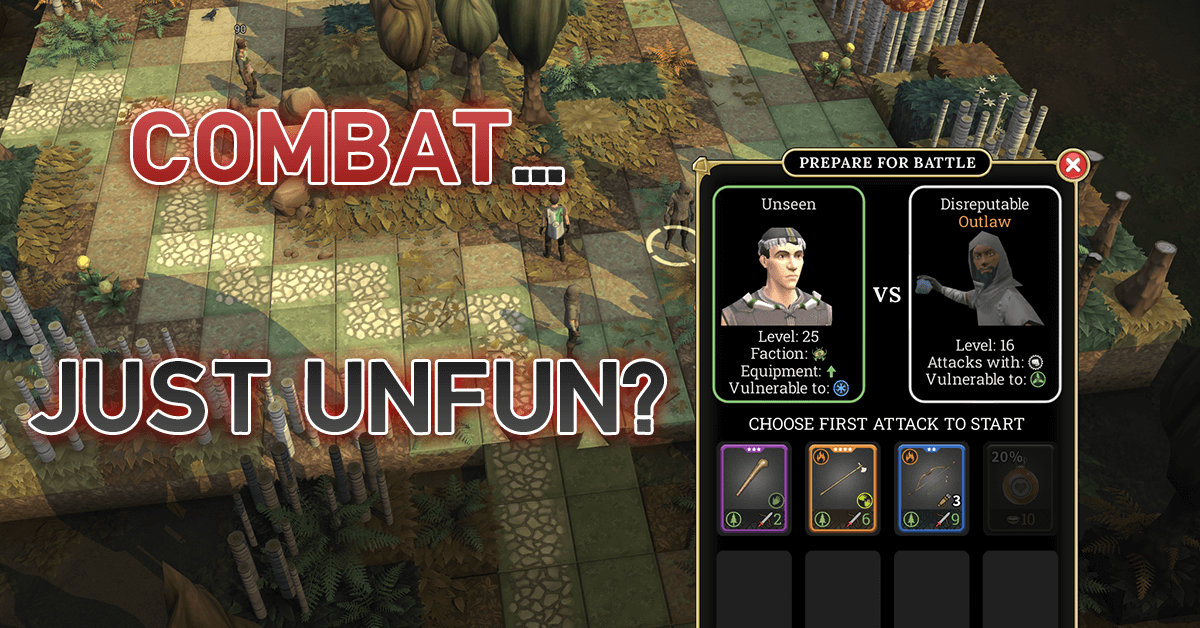
Thankfully, the developers are aware of these issues and have plans to address them. In a recent AMA, Andrew Gower shared that they've had lengthy discussions about how to unify combat professions across Episodes and improve the system overall. This potential update will not only streamline combat progression but also ensure existing save files are migrated without players losing progress.
Here's a direct quote from the AMA:
"We know that a separate combat profession per Episode isn't popular, and think we have now come up with a way of avoiding needing a separate combat profession per Episode AND avoiding the problems I described which caused us to implement it this way in the first place. [...] We also want to make combat cater to more play styles. So you can play it MORE afk if you want, or LESS afk if you want, or just like it is currently if you want."
While details are still under wraps, the hints at catering to multiple playstyles—whether you prefer a hands-on approach or something more AFK-friendly—are exciting. A combat overhaul will be a "fairly time-consuming update," according to Andrew, but it's clear the team sees it as a high priority.
For now, combat may feel like a weak link compared to the rest of the game's systems, but the promise of a more engaging, unified experience in the near future gives me a lot of hope. If the combat update delivers, it could transform Brighter Shores into a much more compelling MMO experience.
Social Features and Multiplayer Plans: Building a Community
While Brighter Shores already offers plenty of solo content to enjoy, the social aspects of the game are still in their early stages. At this point, multiplayer features are limited, but the developers have ambitious plans to flesh out these systems before the game leaves early access.
One of the most exciting upcoming features is player-to-player trading, which is expected to roll out soon™. Trading has always been a cornerstone of multiplayer MMOs, and its addition will undoubtedly add a new layer of depth to the game's economy. I actually have my own Brighter Shores-related project planned around trading, so stay tuned—I'll share more details in an upcoming blog post.
Another major feature on the horizon is player-vs-player (PvP). Andrew Gower has stated that PvP will focus on duels where players can challenge each other and stake items—a nod to the classic RuneScape Duel Arena. This style of PvP is straightforward, competitive, and nostalgic for players who enjoyed similar systems in older MMOs.
Beyond PvP, we'll also be seeing improvements to co-op gameplay. Right now, there are a handful of cooperative training methods in the game, but not many. That's likely to change as the developers add more group-oriented activities like boss fights, raids, and minigames. Alongside these updates, a party system is in the works, which will allow players to team up formally and take on challenges together.
The roadmap for social features makes it clear that Brighter Shores is being designed with community interaction in mind. While the game might feel a bit quiet on the multiplayer front right now, these upcoming additions will give players more ways to connect, compete, and cooperate. And with trading and PvP right around the corner, it won't be long before the game feels much more alive and dynamic.
Audio and Visuals: Functional but Room for Improvement
The audio and visuals in Brighter Shores are pretty much what you'd expect if you've seen the trailer—nothing groundbreaking, but certainly not bad either. The art style reminds me (and a lot of others) of RuneScape 3, with a hint of Albion Online's aesthetic, though Brighter Shores does feel a bit more detailed than Albion. It's a style that works well for the game and gives Adothria a clean, recognizable look.
The visuals are perfectly serviceable, and I don't think there's anything inherently wrong with them. That said, I'd love to see more graphic options added for players on high-end PCs. Considering I'm running a solid setup with an Nvidia RTX 4070, it would be great to have settings that enhance what's already there—more detail, better lighting, or higher resolution textures.
As for the audio, I'll admit I don't pay much attention to it while playing. I often have YouTube or music on in the background, especially when training combat professions—the repetitive clanking of swords can get old pretty quickly. That said, during the times when I've turned the sound up, I found it enjoyable and fitting for the game's atmosphere.
Where Brighter Shores really needs improvement, though, is its client and user interface—particularly for PC players. Right now, the interface feels like a "one size fits all" solution designed to work on everything from phones and tablets to desktops. While it's great for accessibility, it's a bit limiting for those of us playing on computers.
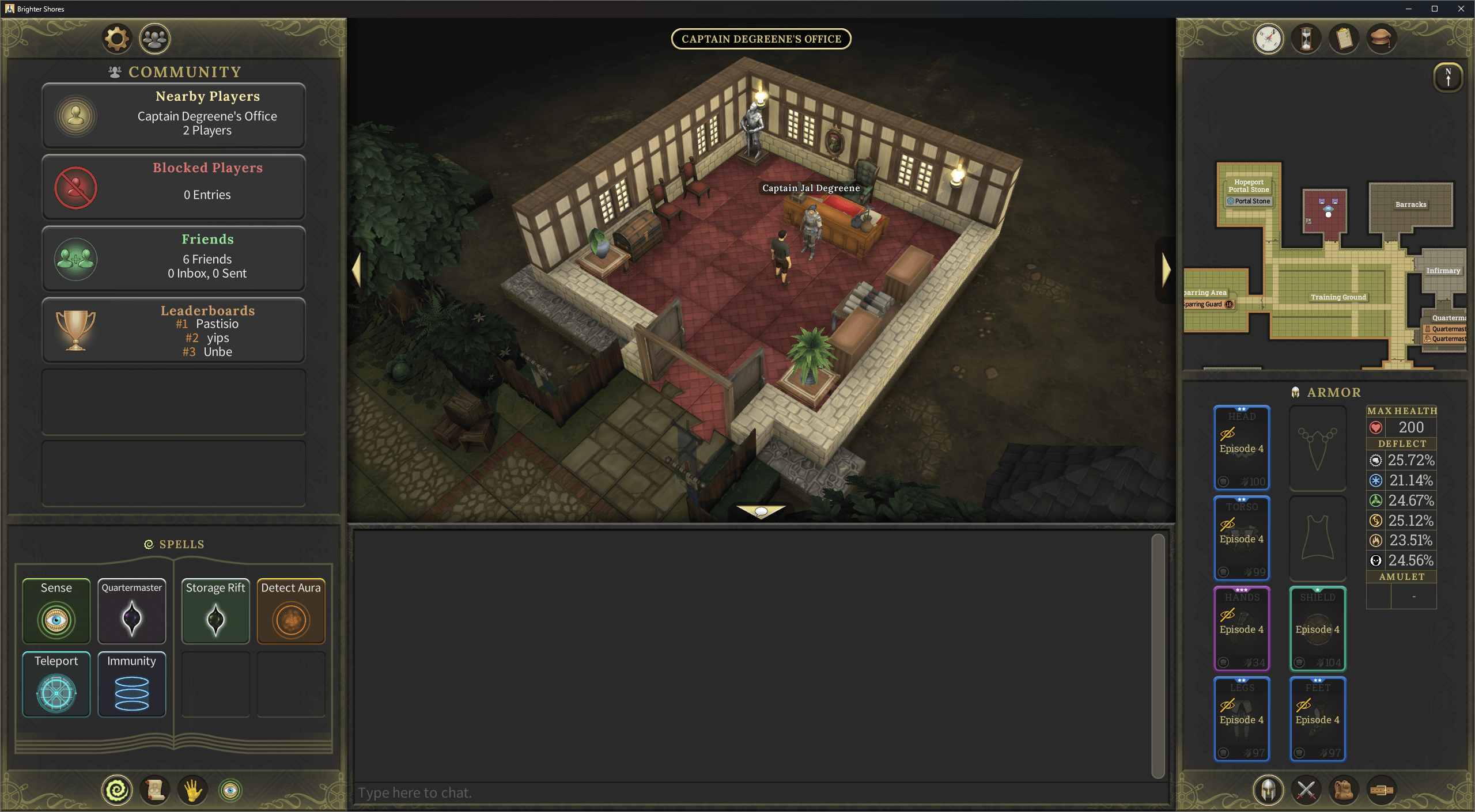
I'd love to see a customizable PC client in the future. Imagine being able to:
- Open as many tabs as you want and position them wherever you like.
- Always see chat without having to have the giant panel at the bottom open.
- Add plugins or mods to enhance the experience (this would be AWESOME).
A more flexible interface tailored to PC users would go a long way in improving gameplay, especially for those of us who spend hours grinding professions or exploring the game's content.
Free-to-Play and the Premium Pass: A Fair Monetization Model
One of the great things about Brighter Shores is that it's completely free-to-play, with an optional Premium Pass priced at $6 USD per month. For a game in early access, this model strikes a good balance between accessibility and offering extra perks to players who want to support the developers.
So, what does the Premium Pass actually offer? Here's a quick breakdown:
- Access to Episodes 3 and 4 (and future Episodes).
- Player-to-player trading (coming soon).
- The ability to use a standard username (and change it whenever you like) without the auto-generated numbers at the end (e.g., "username" instead of "username#3").
- The ability to change the color of your armor.
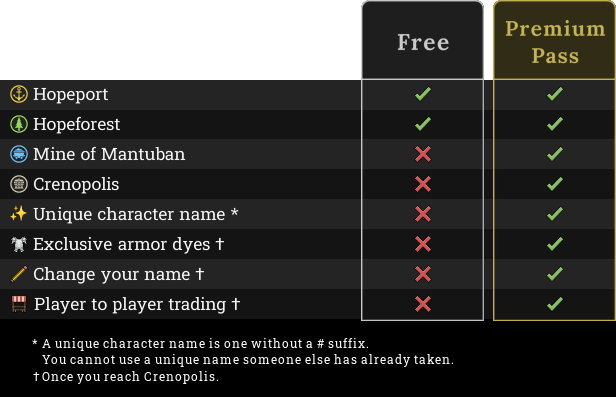
While the Premium Pass offers clear benefits, it doesn't lock core content behind a paywall. Episodes 1 and 2 are fully free, allowing players to experience a significant chunk of the game before deciding whether to invest. This feels like a fair approach and avoids the frustration that comes with pay-to-win mechanics seen in some other MMOs.
From my experience, the Premium Pass is well worth the $6/month. I've racked up nearly 300 hours of playtime so far, and even if I factor in the times I left the game running while working (let's call that about 80 hours of AFK), that's still a solid 200 hours of actual gameplay. For a game that's still in early access, that's impressive value—and there's so much more to come.
If you're on the fence, I'd recommend giving the free version a try first. You'll get a real sense of the game's systems and whether Brighter Shores is for you. And if you decide to stick around for the long haul, the Premium Pass is an easy way to get the most out of your experience while supporting the continued development of the game.
Future Content: Episode 5 and Beyond
While Brighter Shores already has a lot to offer, the future looks even brighter with the development of Episode 5 already underway. Andrew Gower and the team have made it clear that expanding the world of Adothria is a top priority, but they're also taking the time to address important systems before pushing out new content.
Episode 5 promises to bring more quests, professions, and new areas to explore, continuing the game's episodic progression model. However, Andrew has mentioned that work on Episode 5 is being slightly held back for now as the team focuses on other core updates—like combat improvements and social systems—that will make the game feel more polished and complete overall.
This approach makes a lot of sense. It ensures that the foundation of Brighter Shores is solid before adding another layer of content. For players, this means we're likely to see features like trading, PvP, and the upcoming combat overhaul implemented before Episode 5 arrives. These systems will breathe new life into the existing world and provide a much stronger platform for future Episodes to build on.
Even beyond Episode 5, the long-term vision for Brighter Shores is exciting. The idea of a couple new episodes a year means there's always something new to look forward to—whether it's fresh quests, professions, or areas to explore. The world of Adothria feels alive and ever-evolving, and that's exactly what you want from an MMO.
Personally, I love exploring what Andrew Gower and the team at Fen Research have crafted so far. Brighter Shores is a beautiful, carefully designed game, and it's clear that a lot of thought and love has gone into its creation. With so much planned for the future, I have no doubt that it will continue to grow and improve for many years to come.
If you haven't tried Brighter Shores yet, now's the perfect time to dive in. The game is free-to-play, so there's no reason not to explore and see what it's all about. You can check it out on Steam and join the growing community as we watch this game evolve.

